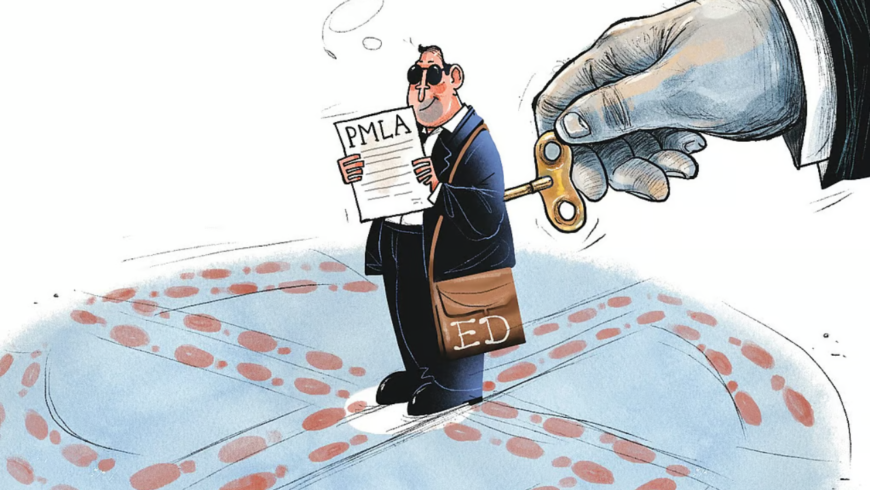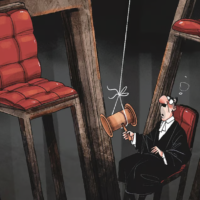In no state where the ruling party is in power or in a coalition, or even at the Centre, has any politician been investigated under the PMLA. This only seems to happen in opposition-ruled states
Our Constitution is quasi-federal. This was a historical necessity. When it was adopted, the princely states integrated into the Republic continued to have elements which, in the absence of a strong Union, could have disturbed our constitutional enterprise. In a country as large as India with a population of 1.4 billion, the epicentre of power in Delhi makes it difficult for states to develop at their own pace considering their unique needs and priorities. The flow of finances to states is largely controlled by the Union.
Despite the manner in which resources are to be shared between the Union and states as allocated by each Finance Commission every five years, the Union continues to garner additional resources through imposition of cess and other levies that it need not share with the states. Being the recipient of a large share of revenues, states are not given enough independent economic space to cater to their needs. The Union government, along with the Reserve Bank of India, is the arbiter of their destiny.
But a far more serious issue that confronts the federal structure of the nation today relates to the rampant misuse of the Prevention of Money Laundering Act, 2002 (PMLA). It is evident from the manner in which the investigation arm, the Directorate of Enforcement (ED), has been functioning under the present government. The situation has been exacerbated by a judgement of the Supreme Court, allowing for its rampant misuse.
The PMLA is perhaps the most draconian law in the history of India. Preventive detention laws, which were often used at one time, still provided for procedural safeguards that are absent in this legislation. The Terrorist and Disruptive Activities (Prevention) Act, 1987 (TADA), another draconian law, targeted individuals, not states.
Similarly, the Unlawful Activities (Prevention) Act, 1967 (UAPA), is person and organisation centric. Both the erstwhile TADA and the present UAPA essentially sought to prosecute those who, through their alleged acts of violence, destabilised or attempted to destabilise the state. In contrast, the PMLA, by targeting individuals associated with the opposition party in power in states, is destabilising the federal structure of this country. The following analysis of the PMLA and its focused application will demonstrate this fact.
Under the PMLA, the ED, under the control of the Union, can access any state to investigate the alleged offence of money laundering. This can only be done if an offence alleged to have been committed is part of the offences specified in the Schedule to the PMLA. Such an offence is called the ‘predicate offence’. If the offence generates a monetary benefit, it is referred to as the ‘proceeds of crime’.
What happens on the ground is that the moment a predicate offence takes place in a state—which is a scheduled offence like cheating (420), forgery (467 – 471) and other offences under the Indian Penal Code like murder (302), culpable homicide not amounting to murder (304), along with violations of provisions of enumerated statutes—the ED, though not obliged to, registers, in its discretion, what is called an Enforcement Case Information Report (ECIR). This gives it the right to enter that state and start investigating the offence of money laundering.
It is appropriate to explain that monies generated from the predicate offence are proceeds of crime and using those proceeds by projecting them as untainted money is ‘money laundering’. By virtue of the explanation added to the definition of money laundering through the Finance Act, 2019, it in effect alters the meaning of money laundering.
The added explanation obliterates the distinction between proceeds of crime and money laundering. Therefore, under the law as it stands today, the proceeds of crime and money laundering allow the ED to enter any state to investigate the offence. This has serious implications on the federating units in our country and the independence of state governments.
There are numerous instances of motivated investigations intended to destabilise regimes in states where the opposition is in power. This has led to divisive litigation between the Union and the states, wherein the states believe the ED is targeting and destabilising them at the behest of the Centre. In Tamil Nadu, for example, the ED has asked for information about all FIRs registered in the state. The obvious intent is to ferret out cases that can be investigated. The ED has also sought information about illegal sand mining, which is not even a part of the schedule of offences under the PMLA.
The modus operandi of the ED is to enter a state the moment a predicate offence is committed and ask the state government to share with the Union the details it seeks. If the complaint is filed or an FIR is registered with respect to a scheduled offence, the ED enters and starts investigating any involvement of the accused named or unnamed. Even though the predicate offence has not resulted in a chargesheet and is at the initial stage of investigation, the ED merrily starts arresting persons. Once arrested, it is impossible for the accused to secure bail because of the stringent legal provisions wherein the court has to come to the conclusion that the accused is not guilty of the offence.
These provisions are being misused in opposition-ruled states wherein incumbent chief ministers find themselves in jail. State politicians and bureaucrats find themselves at the mercy of the ED. So, at the stage of investigation of the predicate offence itself, the ED gets into the act and starts targeting people, including chief ministers and others. This is how both Hemant Soren and Arvind Kejriwal find themselves in jail. Very convenient for the ruling dispensation in the midst of elections!
In no state where the ruling party is in power or is in a coalition government with other parties, or even at the Centre, has any politician been investigated or arrested under the PMLA.
In the case of Kejriwal, no money trail using proceeds of crime has been established. In the case of Hemant Soren, the allegation is of forcibly occupying land which, even if true, is not a predicate offence.
There are multiple other examples of such rampant misuse of laws and the investigating machinery under the present dispensation.











